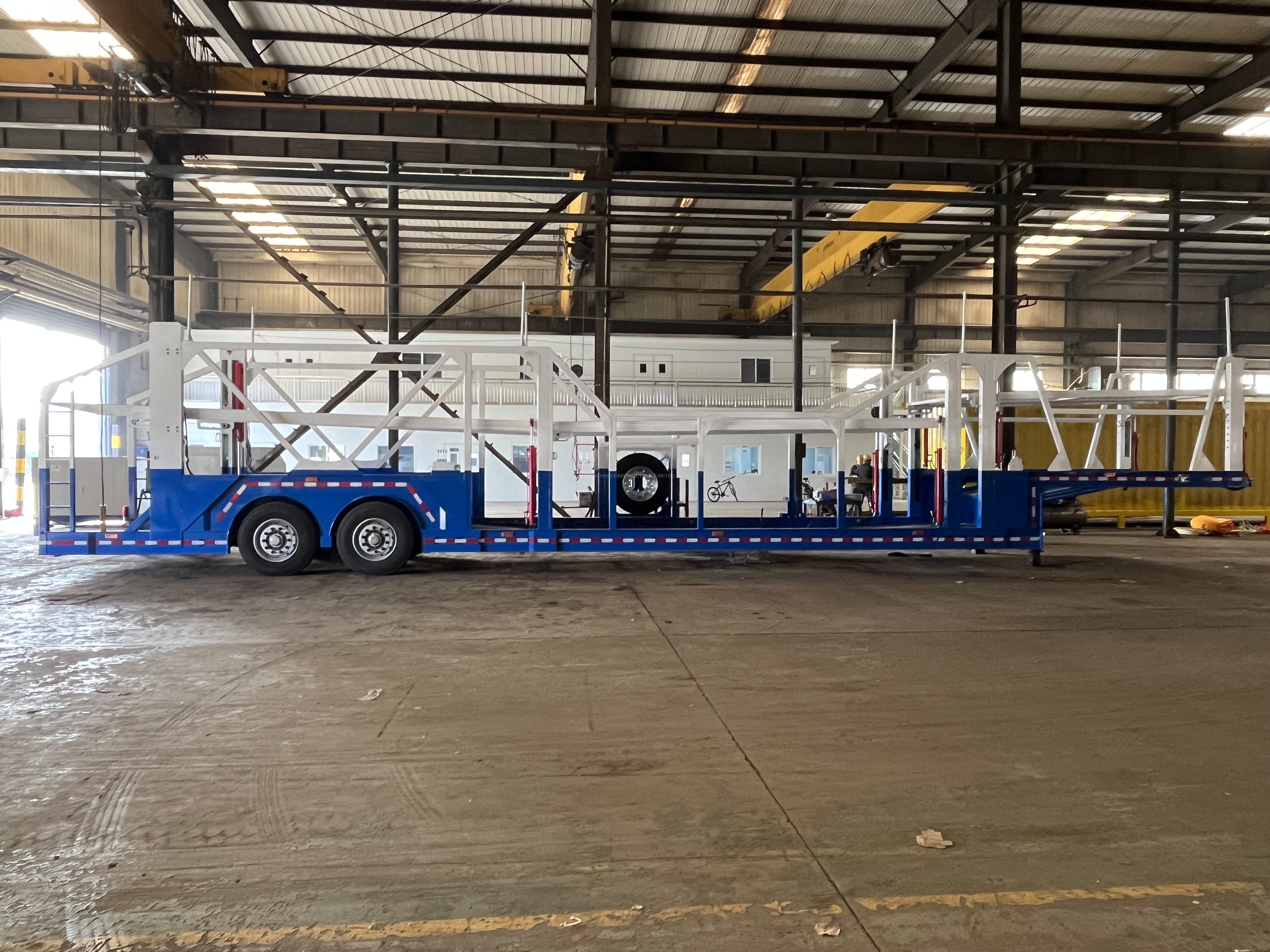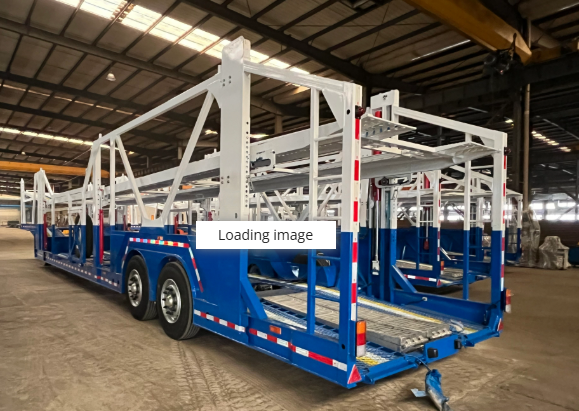Understanding Car Carrier Trailers
Car carrier trailers play a pivotal role in the automotive and transportation industries. These specialized trailers are designed to transport multiple vehicles efficiently and safely over long distances. In this comprehensive analysis, we delve into the intricacies of car carrier trailers, exploring their design, types, and the technology that underpins their operation. By understanding the complexities of these trailers, one gains insight into an essential component of modern logistics and vehicle distribution networks.

Definition and Purpose of Car Carrier Trailers
A car carrier trailer is a type of trailer or semi-trailer designed to transport passenger vehicles via truck. These trailers are equipped with built-in ramps for loading and off-loading vehicles, and they may be open or enclosed. The primary purpose of car carrier trailers is to move multiple vehicles simultaneously, optimizing transportation efficiency and reducing costs for manufacturers, dealerships, and logistics companies.
Historical Evolution
The evolution of car carrier trailers is closely tied to the growth of the automotive industry. In the early 20th century, vehicles were transported individually due to limited demand and production. As automobile manufacturing scaled up, the need for mass transportation of vehicles became apparent. Innovations in trailer design emerged to accommodate more vehicles, leading to the development of multi-level trailers capable of carrying several cars at once.
Types of Car Carrier Trailers
Car carrier trailers can be broadly classified into two categories: open and enclosed trailers.
Open Car Carrier Trailers
Open trailers are the most common type used in the industry. They feature a skeletal structure that allows for vehicles to be loaded on multiple decks, maximizing the number of cars transported. While cost-effective, open trailers expose vehicles to weather elements and road debris.
Modern open car transport trailers have advanced loading mechanisms and securement systems to ensure vehicle safety during transit. The design focuses on balancing structural integrity with weight considerations to comply with transportation regulations.
Enclosed Car Carrier Trailers
Enclosed trailers provide full protection for vehicles against external elements. They are commonly used to transport high-value, classic, or luxury cars that require additional security. Enclosed trailers may offer climate control and advanced security features, but they transport fewer vehicles and involve higher costs.
Design and Engineering Considerations
The design of car carrier trailers involves complex engineering to ensure safety, efficiency, and compliance with legal standards. Key considerations include structural integrity, weight distribution, aerodynamics, and vehicle securement.
Structural Integrity and Materials
Trailers are constructed using high-strength steel or aluminum alloys to provide durability while minimizing weight. The frame must withstand dynamic loads during transit, including acceleration forces, braking, and road vibrations. Welding techniques and material selection are critical to prevent structural failures.
Weight Distribution and Stability
Proper weight distribution is essential to maintain trailer stability and comply with axle load limits. Engineers design the trailer layout to position vehicles in a manner that evenly distributes weight across the trailer's length and width. This involves calculating the center of gravity and ensuring that no single axle bears excessive weight.
Aerodynamics and Fuel Efficiency
Aerodynamic design features are incorporated to reduce air resistance and improve fuel efficiency. This includes streamlined trailer shapes and the use of fairings. For open trailers, the arrangement of vehicles can significantly impact aerodynamic performance.
Vehicle Securement Systems
Securement systems are vital to prevent vehicle movement during transport. These systems include wheel straps, chains, and tie-down points strategically placed to hold vehicles firmly without causing damage. Compliance with safety regulations requires redundancy in securement methods.

Regulatory Compliance and Safety Standards
Car carrier trailers must adhere to a range of regulatory requirements. These include size and weight limits, driver qualifications, and equipment standards set by transportation authorities. Safety standards dictate the inclusion of lighting, reflectors, and braking systems that meet specific performance criteria.
International Regulations
For international transport, compliance becomes more complex due to varying regulations across countries. Trailers may need to be customized to meet regional specifications, such as differing maximum allowable dimensions or securement protocols.
Technological Advancements in Car Carrier Trailers
The industry has witnessed significant technological advancements aimed at improving efficiency and safety. Innovations include hydraulic lift systems, telematics, and automated securement mechanisms.
Hydraulic Lift Systems
Hydraulic systems allow for adjustable decks and ramps, facilitating the loading of vehicles of various sizes and heights. This flexibility enhances loading efficiency and maximizes trailer capacity.
Telematics and Fleet Management
Telematics systems provide real-time data on trailer location, performance, and condition. Fleet managers utilize this data to optimize routes, monitor driver behavior, and schedule maintenance, thereby reducing operational costs.
Automated Securement and Monitoring
Advancements in automation have led to the development of systems that automatically secure vehicles and monitor securement integrity throughout transit. Sensors alert operators to any issues, enhancing safety and reducing the risk of cargo damage.
Economic Impact and Industry Significance
Car carrier trailers are integral to the automotive supply chain. They enable manufacturers to distribute vehicles efficiently to dealerships and customers, maintaining the flow of commerce. The efficiency of these trailers directly affects delivery times, inventory levels, and ultimately, profitability in the automotive sector.
Logistics and Supply Chain Integration
Effective integration of car carrier trailers within logistics networks enhances supply chain responsiveness. By coordinating with rail and port operations, trailers facilitate multimodal transportation solutions, expanding market reach and optimizing distribution strategies.
Environmental Considerations
The industry is increasingly focused on reducing environmental impact. This includes adopting fuel-efficient technologies, exploring alternative fuels, and optimizing load planning to decrease emissions. Sustainable practices are not only environmentally responsible but also offer cost savings through improved efficiency.
Case Study: GDSS Trailer's Innovations
Companies like GDSS Trailer exemplify the advancements in the design and manufacture of car carrier trailers. Established in 2009, GDSS Trailer has become a professional designer and builder in the field. With a team of over 200 employees, including 78 technical workers and 18 advanced engineers, they focus on delivering high-performance trailers tailored to modern transportation needs.
GDSS Trailer's commitment to research and development has led to the creation of trailers with enhanced features such as advanced hydraulic systems, improved aerodynamics, and state-of-the-art securement technology. Their products, including container semi-trailers, low bed semi-trailers, and heavy-duty semi-trailers, have been exported globally, contributing to international logistics solutions.
Challenges and Future Outlook
Despite technological advancements, the car carrier trailer industry faces challenges such as stringent regulatory environments, driver shortages, and the need for continual innovation to meet evolving automotive trends, like the rise of electric vehicles.
Regulatory Challenges
Regulations regarding emissions, driver hours, and safety standards require companies to adapt continually. Compliance necessitates investment in new technologies and training, impacting operational costs.
Technological Adaptation
The advent of electric and autonomous vehicles presents new requirements for transportation. Trailers may need modifications to accommodate different vehicle architectures and to integrate with intelligent transport systems.
Conclusion
Car carrier trailers are a critical component of the automotive industry's supply chain, enabling efficient, safe, and cost-effective transportation of vehicles worldwide. Understanding their design, operation, and the challenges they face is essential for stakeholders in the transportation and logistics sectors. As the industry evolves, companies specializing in these trailers must continue to innovate, prioritizing safety, efficiency, and environmental responsibility.
For those looking to deepen their understanding or to explore modern car carrier trailer options, GDSS Trailer offers a range of products and expertise in this field. Their dedication to advancement exemplifies the industry's potential for growth and adaptation in an ever-changing landscape.



















